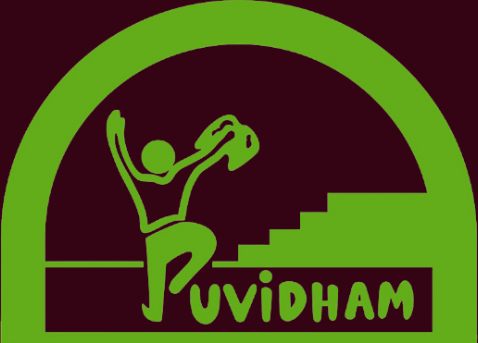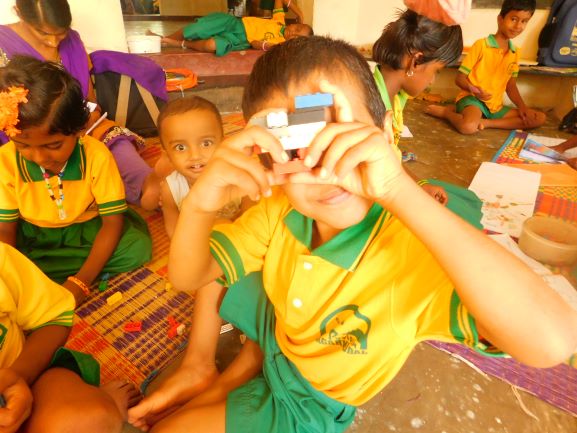The curriculum is based on the Natural Learning process of children. We believe that learning is an instinct. We have created a Non-violent learning environment where Synthesis of knowledge is happening through Experimental learning and Indigenous way of knowing. Through living a simple life children become self-reliant and learn to take initiative to become change catalysts. The concept of “bread labour” as explained by LEO TOLSTOY and later included in the educational revolution called NAI TALIM by Mahatma Gandhi is an integral part of the philosophy of puvidham. The genesis of Puvidham holistic curriculum
Meenakshi, trained at Sir JJ College of Architecture, and her husband Umesh, a mechanical engineer from IIT Madras, decided to attempt to live a sustainable life and build a compassionate community with the local residents of the village. Disillusioned by the inequality and pollution that cities fostered, and in pursuit to create a community where equality and empathy were core ideals; love and compassion the guiding principles and environmental regeneration the main task, they migrated to a rural area in Dharmapuri district in 1992.
With an annual rainfall of 400mm, their land was especially hilly and barren. They created soil and water conservation structures and planted indigenous trees. They also started cultivating ayurvedic herbs, local millet and rice varieties, and other crops organically. Conserving every drop of water, they evolved ways to efficiently wash vessels, clothes and bathe. Notably, they have developed a compost toilet that uses soil as a cover and a twin-chamber system that involves no handling of wet waste while converting human manure into compost.
Over three decades, this land has been transformed into a beautiful young forest, teeming with more than 300* varieties of indigenous trees. Despite the low rainfall, they have developed methods to water the trees in the subterranean areas and keep them alive through the harsh summers. Water levels and soil carbon have increased considerably on their land. Each structure on campus is also an experiment in natural building which uses recycled and local materials, especially mud.
Through the 3 decades, Meenakshi has lived at the campus along with children.
Their day starts at 4.30 am during the brahma muhurta considered most conducive to emotional and mental health. A team is working in the kitchen to prepare breakfast and lunch. All the others do yoga for 30 minutes and then read whatever interests them. As soon as day breaks, all of them have their health drink and the kitchen group is busy cleaning vessels and the fireplace. The other 3 groups go to their respective tasks of gardening, animal husbandry, and cleaning and organising the living and toilet spaces. By around 8.00 am breakfast is served and at 8.30 am everyone goes to the garden to record the growth, health and needs of their particular plants. They sketch the plants and insects and meditate in silence. At 9.30 am everyone goes to the school buildings and cleans and waters the plants around. 10 am is snack time where snacks made from millets or seasonal fruits are served. From 11.am to 1.00 pm there are academic sessions for those children who want to attend the others can play or do anything they like as long as they are not disturbing the others. From 12.00 pm to 1.00 pm is crafting time when the children and adults engage in creating useful articles from waste. Lunch break is from 1.00 pm to 2.00 pm. After lunch the academic session continues till 3.30 pm and thereafter the children spend half an hour with their trees and plants around the classrooms watering and weeding them. 4.00 to 5.00 pm is play time. From 5 to 6.00 children are involved in personal chores and collection of vegetables and greens from the garden. One group is busy cooking dinner. After a simple dinner of local millets at 7.30 pm children read till 8.30 and then it’s time to sleep.
Puvidham Learning Centre is an alternative learning space dedicated to allowing children the freedom to learn rather than focusing on teaching. The learning centre was started in 2000 as a home school for Meenakshi’s children. Slowly the local people who came to help with organic farming decided to send their children to learn with them and the learning centre came into being.
Over 2500 students have been at Puvidham for various time periods in the last two decades. A majority of the students have come from local rural areas, and a smaller minority from cities. Most of the students are first generation literates. For children from economically poor backgrounds, scholarships are offered. Few children, predominantly who come from cities, come from challenging backgrounds, and have behavioural issues or learning difficulties. The environment of freedom and responsibility that has been fostered at Puvidham helps these children to learn self-discipline and their self-esteem improves making them better learners.
Over the years, the school has evolved a curriculum for education for sustainable living and has been working majorly with local farmer’s children. Meenakshi had hoped that over the years the parents would become interested in organic farming and they would support the children to set up small startup businesses connected with the land and the local resources. But the parents have their own biases, fears and aspirations which indicate that they do not want their children to remain in the village.
After COVID there was a need to reconsider the intention of the school experiment. In the years 20-21 and 21-22, covid time, we had to re organize ourselves to make our curriculum available to the children online in the home environment. The children of Puvidham online school fared much better during Covid and did not get addicted to social media etc. This led to creation of an online schooling program for home schoolers. With this arose the need to compile the Puvidham curriculum which has been meticulously crafted over the two decades, in the form of books which can guide homeschooling parents to facilitate learning for their children.
The school has now become a space for children whose parents believe in the philosophy of Puvidham and are on the road to change their own lives minimizing their consumption and creating opportunities for small business in the alternative space.

